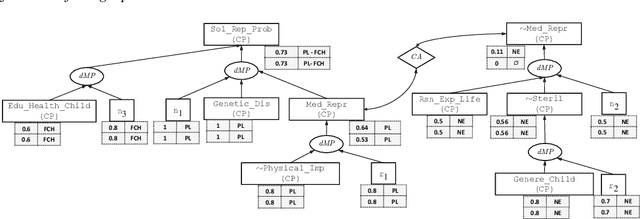Maximiliano C. D. Budán
Dealing with Qualitative and Quantitative Features in Legal Domains
Mar 05, 2019
Abstract:In this work, we enrich a formalism for argumentation by including a formal characterization of features related to the knowledge, in order to capture proper reasoning in legal domains. We add meta-data information to the arguments in the form of labels representing quantitative and qualitative data about them. These labels are propagated through an argumentative graph according to the relations of support, conflict, and aggregation between arguments.
* arXiv admin note: text overlap with arXiv:1903.01865
Bipolar in Temporal Argumentation Framework
Mar 05, 2019



Abstract:A Timed Argumentation Framework (TAF) is a formalism where arguments are only valid for consideration in a given period of time, called availability intervals, which are defined for every individual argument. The original proposal is based on a single, abstract notion of attack between arguments that remains static and permanent in time. Thus, in general, when identifying the set of acceptable arguments, the outcome associated with a TAF will vary over time. In this work we introduce an extension of TAF adding the capability of modeling a support relation between arguments. In this sense, the resulting framework provides a suitable model for different time-dependent issues. Thus, the main contribution here is to provide an enhanced framework for modeling a positive (support) and negative (attack) interaction varying over time, which are relevant in many real-world situations. This leads to a Timed Bipolar Argumentation Framework (T-BAF), where classical argument extensions can be defined. The proposal aims at advancing in the integration of temporal argumentation in different application domain.
An Approach to Characterize Graded Entailment of Arguments through a Label-based Framework
Mar 05, 2019



Abstract:Argumentation theory is a powerful paradigm that formalizes a type of commonsense reasoning that aims to simulate the human ability to resolve a specific problem in an intelligent manner. A classical argumentation process takes into account only the properties related to the intrinsic logical soundness of an argument in order to determine its acceptability status. However, these properties are not always the only ones that matter to establish the argument's acceptability---there exist other qualities, such as strength, weight, social votes, trust degree, relevance level, and certainty degree, among others.
 Add to Chrome
Add to Chrome Add to Firefox
Add to Firefox Add to Edge
Add to Edge